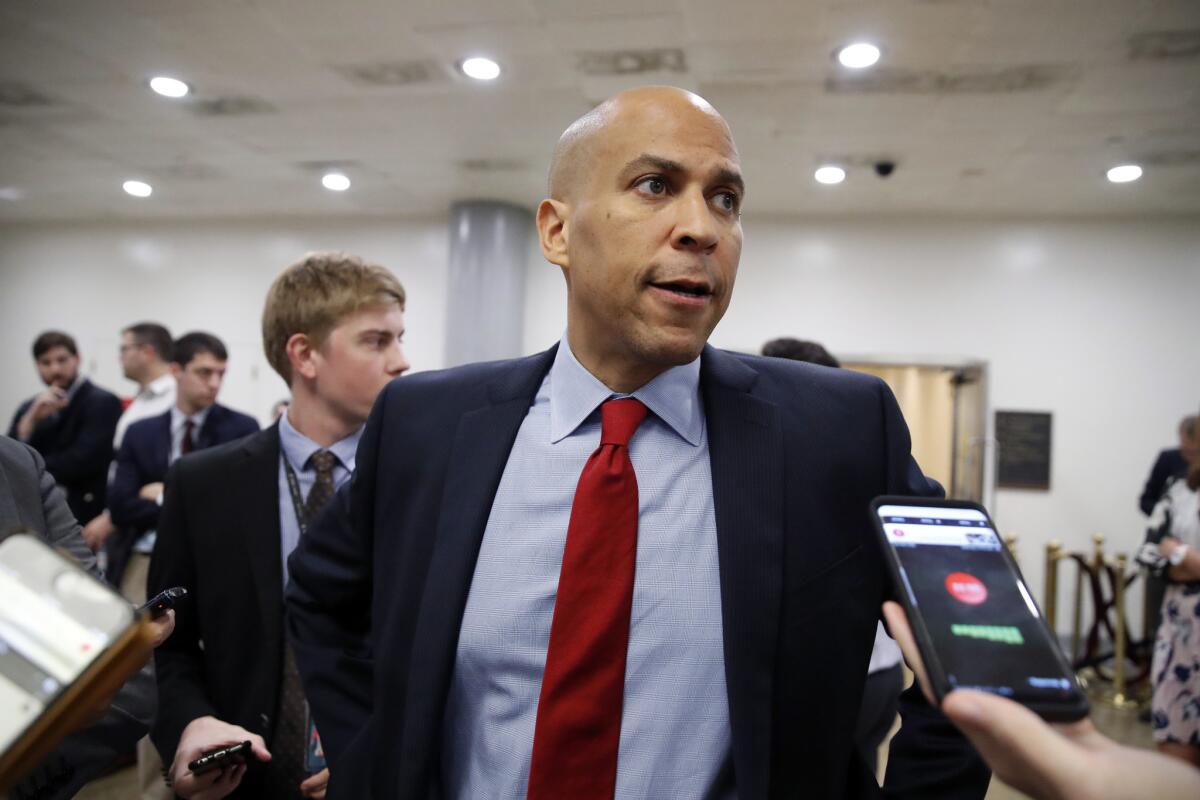Democrats signal they will block Senate GOP plan on police reform, calling it weak

- Share via
WASHINGTON — Senate Democrats indicated Tuesday that they will block the current version of a GOP policing reform bill, calling it “woefully inadequate” to meet the broad changes needed in response to the nationwide protests over George Floyd’s death.
A Minneapolis police officer has been charged with killing Floyd, an unarmed, handcuffed Black man, by kneeling on his neck for more than 8 minutes.
The Senate is scheduled to vote Wednesday on whether to bring the GOP-backed Justice Act, sponsored by Sen. Tim Scott (R-S.C.), up for consideration. It would require 60 votes to advance, meaning Republicans — who hold 53 seats — need some Democratic votes.
Senate Minority Leader Charles E. Schumer (D-N.Y.) and Sens. Kamala Harris (D-Calif.) and Cory Booker (D-N.J.) sent a letter to Senate Majority Leader Mitch McConnell (R-Ky.) Tuesday arguing for bipartisan negotiations on the bill before it comes to the Senate floor.
“This is a serious challenge requiring serious solutions,” the three senators wrote to McConnell in the letter, provided to The Times in advance of its release. “Bringing the Justice Act to the floor of the Senate is a woefully inadequate response, and we urge you to bring meaningful legislation to the floor for a vote.”
On the Senate floor Tuesday, Schumer called Scott’s bill a “partisan bill that’s designed to make sure no bill passes.”
Both parties are feeling public pressure to do something.
“It’s completely insane is what it is. People’s memories are so short that they don’t remember the commitments we all made to people like George Floyd’s family,” Sen. John Cornyn (R-Texas) said. “Where are the grownups?”
Democrats have complained that they weren’t consulted in the drafting of the GOP bill, which focuses heavily on collecting information about police use of force and creates a commission to study societal issues facing Black men and boys. They also noted that it is being moved without any hearings.
Republicans point to similarities between their bill and one that the House is scheduled to vote on Thursday, and say that Democrats can offer amendments during floor consideration.
“We’re ready to work with Democrats on police reform. I hope they’re finally willing to come to the table,” Sen. Charles E. Grassley (R-Iowa) said on the Senate floor Tuesday. “A successful vote to proceed on the Justice Act speaks volumes. A vote against shows the American people that politics are more important than the people; talking points more important than change; and gridlock more important than solutions.”
McConnell is allowing senators to propose any amendments they want, but it is unlikely that meaningful changes would be made to the legislation once it got to the Senate floor, where the majority could act without support from the minority party. Once the 60-vote threshold is met to advance legislation in the Senate, it only takes a majority to approve or reject an amendment.
Subsequent votes on the bill would need the support of 60 senators for final passage, McConnell noted, giving Democrats the opportunity to block it if they didn’t get the changes they sought. And if the versions passed by the House and Senate differ greatly, a conference committee of House and Senate members would negotiate a compromise bill.
“The only thing that’s blocking this right now is the Senate Democrats, and the Senate Democrats aren’t just blocking Tim Scott’s bill. They are blocking an open bipartisan debate about policing reform in this country,” said Senate Majority Whip John Thune (R-S.D.).
Both measures would make lynching a federal crime, but there are also key differences.
Both would require police departments to provide data to the federal government in cases where force is used by officers, but differ significantly on when data is required and how much.
The GOP bill only requires data on the use of deadly force or serious injuries, and “no-knock” warrants, while the House bill asks for data whenever force is used against civilians, and for identifying information, like the race or ethnicity of those involved.
Both require disciplinary records to be more accessible to other agencies, though the Democrats’ bill would create a national registry including complaints, disciplinary records and termination records, and make some records public.
The Republican bill is “merely offering to study the problem without doing anything to solve it. That’s empty,” Harris said. “We can’t answer the people’s demand for accountability with watered-down politics and watered-down policies and an obstructionist tactic to distract us from what we clearly know is necessary to meet the calls and the cries of this moment and this movement.”
Unlike the House Democrats’ bill, the Senate Republicans’ bill doesn’t modify so-called qualified immunity for police officers, which has made it harder for victims of brutality to file civil lawsuits for excessive force. Neither does the Senate GOP bill make it easier to prosecute police officers for criminal behavior, as the House version does.
The Senate bill encourages state and local police departments to make changes to standards for training and for when force is acceptable, and would penalize departments that don’t mandate the use of body cameras.
House Democrats’ bill bans federal officers from using chokeholds, stops the use of no-knock warrants in federal drug cases and predicates federal funding on whether state and local officials follow suit. It would also create national accreditation standards for police, including setting a national standard for the use of force.
The Senate bill prohibits federal grant money to departments unless they have a policy banning the “use of chokeholds except when deadly force is authorized.”
Booker called the Republican bill “wholly unacceptable to bring accountability, transparency, consequences when our common values as a nation are violated.”
“The American people are not in the streets chanting, ‘We want more data, we want more data!’” he said. “The American people are not in the streets chanting, ‘Give us a commission, give us a commission!’”
More to Read
Get the L.A. Times Politics newsletter
Deeply reported insights into legislation, politics and policy from Sacramento, Washington and beyond. In your inbox twice per week.
You may occasionally receive promotional content from the Los Angeles Times.











